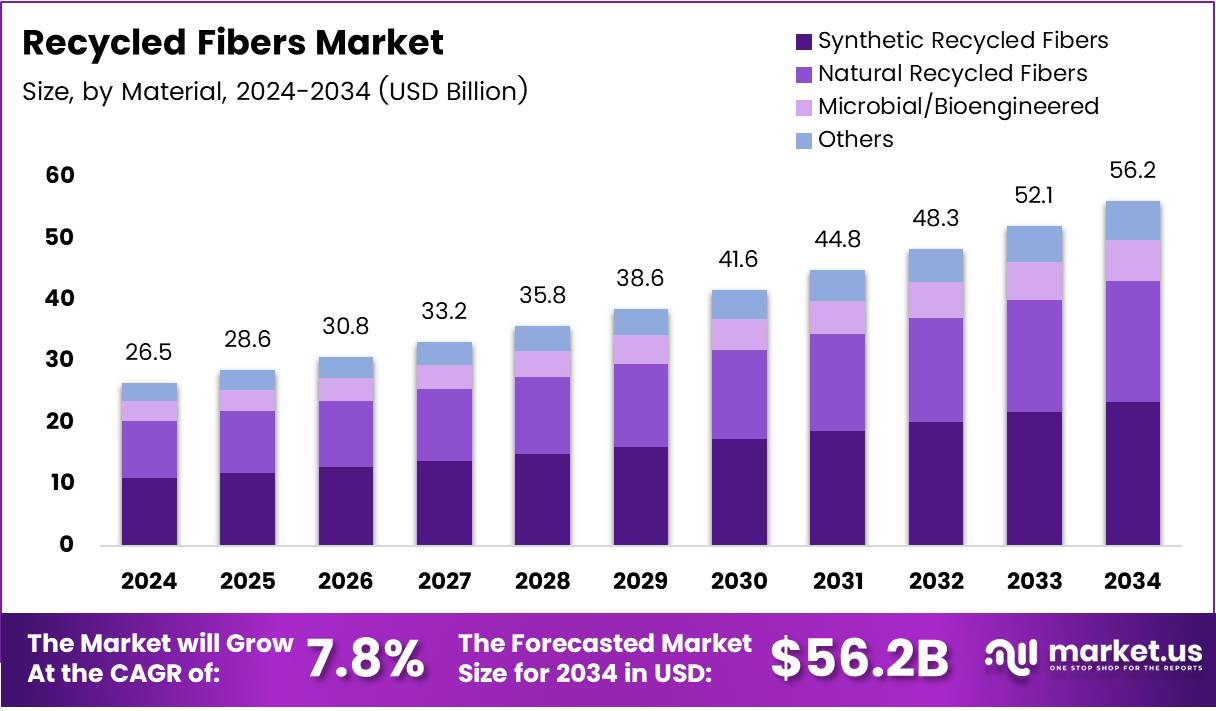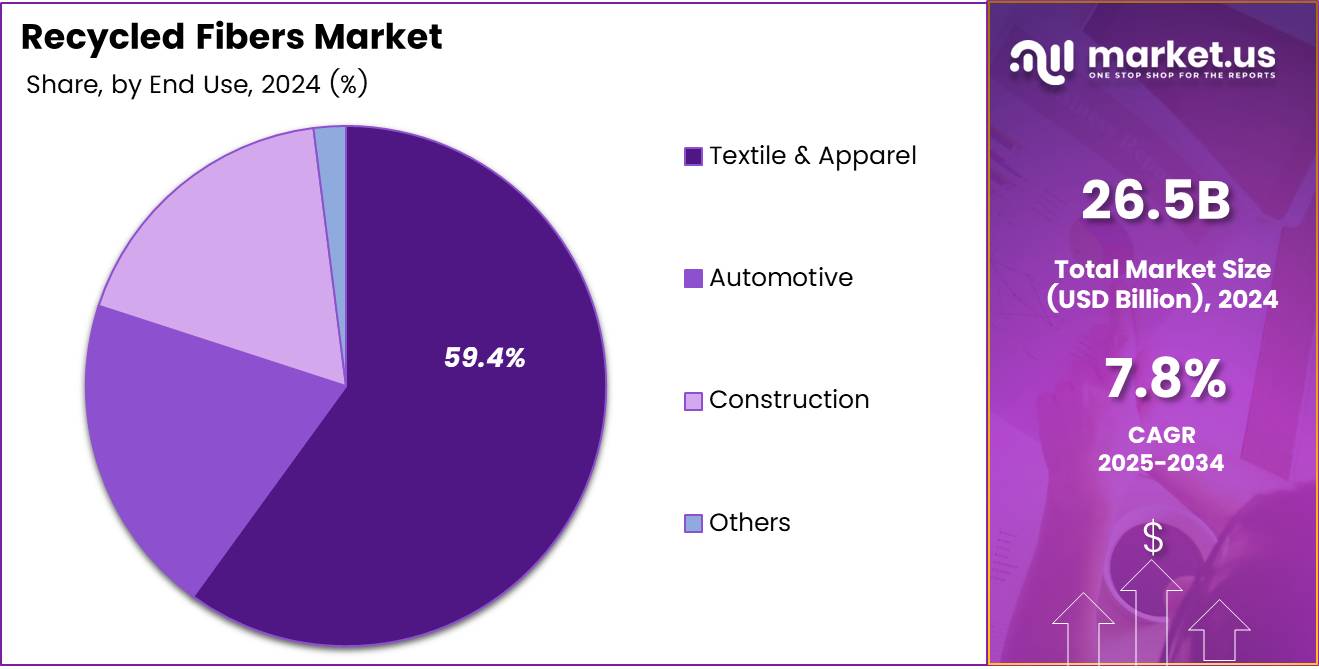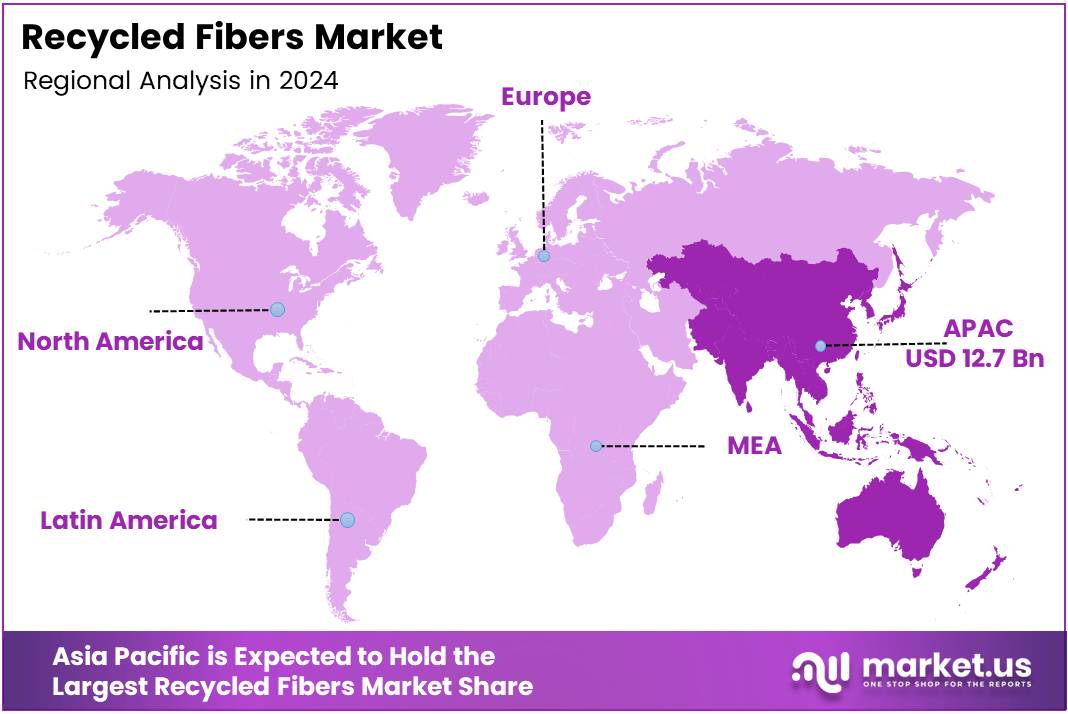Global Recycled Fibers Market Size, Share, Growth Analysis By Material (Synthetic Recycled Fibers, Natural Recycled Fibers, Microbial/Bioengineered, Others), By End Use (Textile & Apparel, Automotive, Construction, Others), By Region and Companies - Industry Segment Outlook, Market Assessment, Competition Scenario, Statistics, Trends and Forecast 2025-2034
- Published date: May 2025
- Report ID: 150123
- Number of Pages: 330
- Format:
-
keyboard_arrow_up
Quick Navigation
Market Size
The Global Recycled Fibers Market size is expected to be worth around USD 56.2 Billion by 2034, from USD 26.5 Billion in 2024, growing at a CAGR of 7.8% during the forecast period from 2025 to 2034. This growth is driven by increasing demand for sustainable materials in industries like fashion and textiles.

Key Takeaways
- The global Recycled Fibers Market is projected to reach USD 56.2 Billion by 2034, growing at a CAGR of 7.8% from 2025 to 2034.
- Synthetic Recycled Fibers dominate the By Material Analysis segment, accounting for 77.4% of the market share in 2024.
- Textile & Apparel lead the By End Use Analysis segment, holding 59.4% of the market share in 2024.
- Asia Pacific holds the largest market share in the Recycled Fibers Market with 47.6%, valued at USD 12.7 billion in 2024.
Report Overview
The recycled fibers market is an emerging segment within the broader textile and waste management industries. It focuses on the reuse of textile fibers from pre-consumer and post-consumer waste. This market has gained momentum due to increasing environmental concerns and the shift towards sustainable practices in various industries.
In recent years, global textile fiber production has surpassed 120 million tons per annum, with a staggering 80% of this fiber ultimately going to waste, according to Revive. This highlights the immense potential for recycling and the growing demand for recycled fibers.
Europe, being a key player in the textile industry, generates over 16 million tons of textile waste annually, with only about 25% being recycled, as reported by Saalasti. This presents both a challenge and a significant opportunity for the recycling sector. As the region grapples with waste management, demand for efficient recycling processes and technologies has risen sharply. Companies and policymakers alike are investing in solutions to increase this recycling rate, making Europe a pivotal market for recycled fibers.
The growth of the recycled fibers market is not just driven by waste reduction goals but also by the growing demand for sustainable and eco-friendly products in the textile industry. With consumers becoming more environmentally conscious, brands and manufacturers are seeking ways to meet the demand for sustainable products, creating a ripe opportunity for recycled fibers. Additionally, government regulations promoting the reduction of textile waste and the introduction of circular economy models are further boosting this market’s growth.
Government investments are playing a key role in driving the development of recycling technologies and infrastructure. Policies that support sustainable manufacturing processes and waste management have led to increased funding for research and development in this sector. With growing attention on the environmental impact of textile waste, the market for recycled fibers is poised to expand significantly in the coming years.
Material Analysis
Synthetic Recycled Fibers lead with 77.4% due to durability and wide industrial application.
In 2024, Synthetic Recycled Fibers held a dominant market position in the By Material Analysis segment of the Recycled Fibers Market, with a 77.4% share. This dominance is largely attributed to their high strength, versatility, and ability to mimic virgin synthetic fibers while offering sustainable benefits. Industries such as fashion, automotive, and home furnishings increasingly prefer these materials for their cost-efficiency and performance parity with conventional synthetics.
Natural Recycled Fibers followed as the second most preferred material. While not as widely used, they remain popular in niche applications where biodegradability and eco-friendliness are prioritized. Their presence in the market continues to grow, especially in small-scale and organic textile production.
Microbial/Bioengineered fibers are emerging players in this landscape. Although their current share is limited, innovations in biotechnology are paving the way for more scalable production. These materials are gaining attention for offering a circular solution to textile waste.
The Others category includes a mix of experimental and lesser-known fiber types. While holding a smaller market portion, this segment reflects ongoing R\&D efforts and interest in diversifying recycled material sources.
End Use Analysis
Textile & Apparel leads with 59.4% as sustainability trends reshape fashion and fabric demand.
In 2024, Textile & Apparel held a dominant market position in the By End Use Analysis segment of the Recycled Fibers Market, with a 59.4% share. This leadership stems from rising consumer demand for sustainable fashion and brands integrating recycled materials into mainstream collections. Recycled fibers offer a low-impact alternative to virgin textiles, making them a go-to solution in both fast fashion and premium segments.
The Automotive industry has shown growing interest in incorporating recycled fibers into vehicle interiors and components. Though smaller in comparison, this segment reflects the auto sector’s move toward sustainability goals and eco-friendly manufacturing practices.
The Construction segment also represents a developing application field. Recycled fibers are being tested and utilized in insulation, composites, and reinforcement materials. Their role in green building initiatives is expected to grow as regulatory frameworks tighten.
Others comprises various industries such as packaging and furniture, which are experimenting with recycled fiber integration. While currently holding a minor share, this category hints at the potential for diversified adoption as more sectors align with circular economy principles.

Key Market Segments
By Material
- Synthetic Recycled Fibers
- Natural Recycled Fibers
- Microbial/Bioengineered
- Others
By End Use
- Textile & Apparel
- Automotive
- Construction
- Others
Drivers
Growing Consumer Demand for Sustainable and Eco-Friendly Products Drives Market Growth
The recycled fibers market is expanding significantly due to increasing consumer demand for sustainable and eco-friendly products. More people are becoming aware of environmental issues, which motivates them to choose products made from recycled materials. This shift in consumer preference encourages manufacturers to focus on recycled fibers.
Additionally, governments and regulatory bodies worldwide are putting pressure on industries to reduce waste and promote recycling. These regulations help create a favorable environment for recycled fibers by setting standards and encouraging businesses to adopt greener practices.
Technological advancements have also played a key role in the growth of this market. Improvements in recycling methods and fiber production have increased the quality and variety of recycled fibers available. These innovations make recycled fibers more competitive compared to virgin fibers, opening new opportunities for their use.
Moreover, the fashion and textile industries are increasingly adopting recycled fibers in their products. Brands are responding to consumer demands and regulatory pressures by incorporating recycled materials into their designs. This rising adoption across different sectors boosts market growth and helps create a more sustainable future.
Restraints
High Costs Associated with Recycling Processes and Technology Upgrades Restrain Market Growth
Despite the positive trends, the recycled fibers market faces several challenges that slow its growth. One major issue is the high cost involved in recycling processes and upgrading technology. Recycling fibers requires advanced equipment and energy, which can make the final product more expensive than traditional fibers.
Another restraint is the limited availability of high-quality recycled fiber materials. Not all recycled fibers meet the quality standards needed for certain applications, which restricts their use in premium products. This shortage limits the market’s potential to grow in some industries.
Moreover, the lack of standardized regulations and certifications for recycled fibers creates confusion. Without clear guidelines, manufacturers and consumers find it difficult to trust the quality and sustainability claims of recycled fiber products. This gap in regulation holds back wider adoption.
Lastly, consumer perception remains a challenge. Some buyers still doubt the durability and appearance of products made from recycled fibers. Overcoming these negative perceptions requires more education and marketing efforts to highlight the benefits and quality of recycled fiber products.
Growth Factors
Expansion of Recycled Fiber Use in Automotive and Industrial Applications Presents Growth Opportunities
The recycled fibers market has promising growth opportunities, especially with expanding use in automotive and industrial sectors. These industries are looking for sustainable and lightweight materials, and recycled fibers fit these needs well. This trend can open new markets beyond textiles and fashion.
Innovative recycling technologies also provide opportunities to improve fiber quality. Advances in processing methods can make recycled fibers more durable and versatile, increasing their acceptance in different applications. Continuous innovation is key to unlocking further market potential.
Leading brands investing more in sustainable production contribute to market growth as well. Companies are dedicating resources to develop eco-friendly products, which boosts demand for recycled fibers. Such investments create momentum for industry-wide change.
Furthermore, the rise of eco-conscious consumer segments in emerging markets offers new avenues for growth. As awareness grows in these regions, demand for sustainable products, including those made from recycled fibers, is expected to increase significantly.
Emerging Trends
Rising Preference for Circular Economy Models Drives Trends in the Recycled Fibers Market
A major trend shaping the recycled fibers market is the growing preference for circular economy models. These models focus on reducing waste by reusing and recycling materials, which aligns perfectly with the use of recycled fibers. Manufacturers are adopting circular practices to improve sustainability and reduce environmental impact.
Advancements in biodegradable and recyclable fiber innovations also influence the market. New materials that break down easily or can be recycled repeatedly help create products that are both eco-friendly and practical. These innovations support the growth of recycled fiber use.
In both fast fashion and luxury segments, the use of recycled fibers is increasing. Fast fashion brands aim to reduce their carbon footprint, while luxury brands focus on sustainable luxury. This broad acceptance highlights the versatility and importance of recycled fibers.
Additionally, blockchain technology is being integrated into recycling processes to improve transparency and traceability. Consumers and businesses can verify the origin and journey of recycled fibers, building trust and encouraging wider adoption.
Regional Analysis
Asia Pacific Dominates the Recycled Fibers Market with a Market Share of 47.6%, Valued at USD 12.7 Billion
In 2024, Asia Pacific held the dominant position in the recycled fibers market, with a significant market share of 47.6%, valued at USD 12.7 billion. This region’s dominance is driven by its large-scale manufacturing base and increasing demand for sustainable textile solutions. The rapid adoption of recycled fibers in various industries, including apparel and automotive, supports this strong market pres

North America Recycled Fibers Market Trends
North America holds a substantial share of the global recycled fibers market, benefiting from strong regulations supporting sustainability and circular economy initiatives. With the region’s growing environmental awareness, many industries are opting for recycled fibers to meet regulatory demands and consumer preferences for sustainable products. The market is expected to grow steadily, driven by advancements in recycling technology and innovations.
Europe Recycled Fibers Market Trends
Europe continues to show a robust growth trajectory in the recycled fibers market, underpinned by stringent environmental policies and consumer shifts towards sustainable fashion. As one of the leading regions for recycling technologies, Europe is focusing on creating circular supply chains. The growth is further supported by major investments in infrastructure to increase recycling rates in the textile and automotive sectors.
Middle East and Africa Recycled Fibers Market Trends
The Middle East and Africa (MEA) region is gradually gaining traction in the recycled fibers market, driven by an increasing focus on waste management and sustainability. The region’s governments are investing in green initiatives to reduce environmental impact, contributing to market expansion. The demand for recycled fibers in construction and automotive sectors is expected to grow as regional markets evolve towards greener solutions.
Latin America Recycled Fibers Market Trends
In Latin America, the recycled fibers market is gaining momentum, primarily due to the increasing adoption of sustainable practices and government incentives for recycling initiatives. Despite facing challenges such as infrastructure limitations, the market is expected to witness growth, particularly in countries like Brazil and Mexico, which are seeing a shift towards more sustainable textile production methods.
Key Regions and Countries
North America
- US
- Canada
Europe
- Germany
- France
- The UK
- Spain
- Italy
- Rest of Europe
Asia Pacific
- China
- Japan
- South Korea
- India
- Australia
- Rest of APAC
Latin America
- Brazil
- Mexico
- Rest of Latin America
Middle East & Africa
- GCC
- South Africa
- Rest of MEA
Key Recycled Fibers Company Insights
In 2024, Patagonia remains a prominent player in the global recycled fibers market. Known for its commitment to sustainability, Patagonia continues to innovate by incorporating recycled fibers into its product lines, fostering a strong demand for eco-friendly materials.
UNIFI, Inc. has established itself as a leading provider of recycled fibers, particularly through its REPREVE® brand, which produces fibers made from recycled plastic bottles. This initiative aligns with the rising demand for sustainable materials across various industries, positioning the company as a key player.
Recover Textile Systems has made significant strides in the recycled fibers market by providing advanced technology to recycle cotton waste and textiles. The company focuses on creating high-quality fibers from post-consumer and post-industrial waste, thus contributing to both the reduction of waste and the creation of sustainable textile solutions.
Reliance Industries Limited plays a vital role in the market with its strong presence in the polyester recycling sector. Through its initiatives in using post-consumer PET bottles and transforming them into fibers, Reliance supports the transition toward more sustainable practices in the textile industry, especially in emerging markets.
These companies are contributing to the growth of the recycled fibers market through innovations in recycling technologies and sustainable product development, aligning with the global demand for eco-conscious alternatives in the textile and fashion industries.
Top Key Players in the Market
- Patagonia
- UNIFI, Inc.
- Recover Textile Systems
- Reliance Industries Limited
- Hyosung TNC
- Indorama Ventures Public Company Limited
- Infinited Fiber Company
- Aquafil S.p.A.
- Lenzing AG
- Recover Textile Systems
Recent Developments
- In Apr 2025, Fairmat secures €51.5M to bring near-infinite carbon fibre reuse to market, aiming to revolutionize the sustainability of carbon fibre materials through advanced recycling technologies.
- In Mar 2025, Circ secures $25M in funding to scale textile recycling technology, with plans to enhance its capabilities for transforming waste fabrics into high-quality fibers for reuse in the fashion industry.
- In Apr 2025, Forbion leads €18M Series A financing in textile recycling technology company EEDEN, supporting the company’s efforts to develop innovative solutions for recycling synthetic fibers and improving circular economy practices in textiles.
- In Mar 2024, textile recycling company Infinited Fiber closes $43.8M funding round, focusing on expanding its unique fiber regeneration technology that converts textile waste into high-quality fibers for the fashion industry.
- In May 2024, textile recycling startup Syre secures $100M Series A funding, with the capital aimed at scaling its cutting-edge textile recycling process to transform post-consumer textiles into new, valuable raw materials for various industries.
Report Scope
Report Features Description Market Value (2024) USD 26.5 Billion Forecast Revenue (2034) USD 56.2 Billion CAGR (2025-2034) 7.8% Base Year for Estimation 2024 Historic Period 2020-2023 Forecast Period 2025-2034 Report Coverage Revenue Forecast, Market Dynamics, Competitive Landscape, Recent Developments Segments Covered By Material (Synthetic Recycled Fibers, Natural Recycled Fibers, Microbial/Bioengineered, Others), By End Use (Textile & Apparel, Automotive, Construction, Others) Regional Analysis North America (US and Canada), Europe (Germany, France, The UK, Spain, Italy, and Rest of Europe), Asia Pacific (China, Japan, South Korea, India, Australia, and Rest of APAC), Latin America (Brazil, Mexico, and Rest of Latin America), Middle East & Africa (GCC, South Africa, and Rest of MEA) Competitive Landscape Patagonia, UNIFI, Inc., Recover Textile Systems, Reliance Industries Limited, Hyosung TNC, Indorama Ventures Public Company Limited, Infinited Fiber Company, Aquafil S.p.A., Lenzing AG, Recover Textile Systems Customization Scope Customization for segments, region/country-level will be provided. Moreover, additional customization can be done based on the requirements. Purchase Options We have three licenses to opt for: Single User License, Multi-User License (Up to 5 Users), Corporate Use License (Unlimited User and Printable PDF) 
-
-
- Patagonia
- UNIFI, Inc.
- Recover Textile Systems
- Reliance Industries Limited
- Hyosung TNC
- Indorama Ventures Public Company Limited
- Infinited Fiber Company
- Aquafil S.p.A.
- Lenzing AG
- Recover Textile Systems










